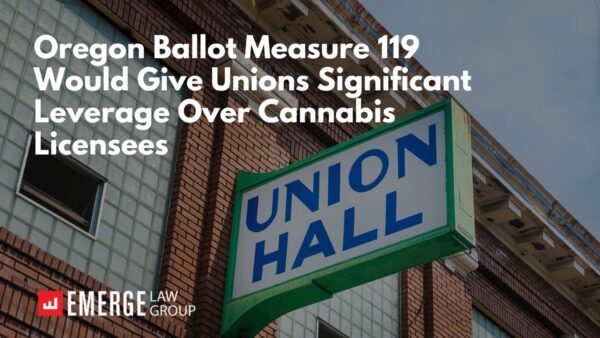Bankers are primarily risk managers, so to understand what happens to canna-banking after Attorney General Jeff Sessions rescinded all Obama-era Department of Justice cannabis memos under which all legal-cannabis states operated (the “Obama Memos”), is to asses risk profile under new federal policy.
On February 14, 2014, the Department of Justice (“DOJ”) and the Department of the Treasury Financial Crimes Enforcement Network (“FinCEN”) issued two companion memos for the stated purpose of “encouraging banking for the cannabis industry.” They came on the heels of the widely-known “Cole Memo”, which set out eight enforcement priorities to guide DOJ attorneys in prosecuting cannabis-related crimes in the wake of Colorado and Washington passing recreational cannabis legislation. The DOJ issued a memo providing Guidance Regarding Marijuana Related Financial Crimes, also penned by James Cole (”DOJ Guidance”), and FinCEN issued FIN-2014-G001 BSA Expectations Regarding Marijuana-Related Businesses (“BSA Guidance”).
The DOJ Guidance, which AG Sessions rescinded along with the other Obama Memos, provided that the DOJ should use its prosecutorial discretion regarding banks and financial crimes related to violations of the Controlled Substance Act, if the banks ensured their customers adhered to the guidelines set forth in the Cole Memo directed to the cannabis industry at large. The DOJ Guidance also identified specific financial crimes a banking institution that did not comply with the DOJ Guidance would be committing. These include: violations of the Bank Secrecy Act (BSA), money laundering statutes, and unlicensed money transmitter statutes.
With the rescission of the Obama Memos on January 4, 2018, presumably banks are now subject to prosecution under all three of the above statutes. Let’s look at how prosecutions under these statutes may be impacted by Sessions’ actions:
Bank Secrecy Act (“BSA”):
Recall that FinCEN issued the BSA Guidance, not the DOJ. Therefore, the BSA Guidance was not impacted. As of this post, FinCEN has not revoked its guidelines and has not commented on plans to change the status of its guidelines.
The BSA Guidance states that if a bank follows the due diligence and reporting requirements identified in its guidelines (“BSA Program”), it will meet its BSA obligations. In other words, if a bank is compliant with the BSA Guidance, Sessions’ rescission is irrelevant.
Laundering of Monetary Instruments, 18 U.S.C. §1956:
The DOJ Guidance also warned against money laundering under 18 U.S.C. §1956. The DOJ’s invocation of this statute had a fatal flaw. Under the statute, money laundering is a financial transaction that involves proceeds of an unlawful activity with the knowledge that the transaction is designed to conceal the nature of the transaction. If a bank has a strong BSA Program in place, there is no design to conceal. The bank will obtain information regarding the nature, location, source, ownership, and control of the transaction, and as opposed to concealing this information they regularly report it all to law enforcement . Again, revocation of the Obama-era memos is irrelevant.
Prohibition of Unlicensed Money Transmitting Businesses, 18 U.S.C. §1960:
An unlicensed money transmitting service is a business that transfers money via wire, check, draft, or other means to move funds without the appropriate license. Typically, banks are licensed, so this should never be an issue. However, the definition of an Unlicensed Money Transmitter also includes any business that transmits money derived from a known criminal offense . In this case a good BSA Program will work against a bank; the bank will know the funds are derived from a Marijuana-Related Business (“MRB ”). Now the question becomes, “Does the revocation of the Obama Memos increase the risk of prosecution for unlicensed money transmissions?
Sessions’ Rescission Memo
In the January 4, 2018 rescission memo, AG Sessions stated that the Obama Memos are unnecessary due to the existence of well-established prosecutorial guidelines set forth in chapter 9-27.000 of the U.S. Attorney’s Manual (the “Manual”), initially published in 1980. He also reiterated that local U.S. Attorneys set the prosecutorial agenda. However, I don’t believe that their agendas will be inconsistent with the wider federal agenda. The federal agenda is to stop marijuana from being manufactured, distributed or dispensed, i.e. enforcement of the Controlled Substance Act.
I’ve attached the relevant section of the Manual:
In determining whether prosecution should be declined because no substantial federal interest would be served by prosecution, the attorney for the government should weigh all relevant considerations, including:
-Federal law enforcement priorities, including any federal law enforcement initiatives or operations aimed at accomplishing those priorities;
-The nature and seriousness of the offense;
–The deterrent effect of prosecution;
–The person’s culpability in connection with the offense;
–The person’s history with respect to criminal activity;
–The person’s willingness to cooperate in the investigation or prosecution of others;
–The interests of any victims; and
–The probable sentence or other consequences if the person is convicted.
Thanks to the BSA Guidance, banks can provide a substantial benefit to law enforcement. Through the due diligence process and ongoing account monitoring, banks obtain large amounts of information on its MRB customers. Then on a quarterly basis, they report that information to law enforcement through SAR reports. If law enforcement wants additional information on any of the reports filed they can call the bank and request additional information, which the bank is required to provide. Banks also prioritize the information into high, medium, and low priorities, so that law enforcement can look into the highest priorities first.
While law enforcement could independently obtain much of the information provided by banks, it would likely take attorneys, judges, and subpoenas, along with months’ or years’ worth of effort. Also, without banks, MRBs would be solely cash based and reliable transaction data would not exist.
Ultimately, the key to serving MRBs is to have a strong BSA/AML program and to fully understand and comply with the requirements of the BSA Expectations regarding MRB guidance. With that in place, the risk of federal prosecution with or without the Obama Memos remains unchanged and generally low, thanks to the benefits that banking provides.





